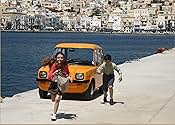Adicionar um enredo no seu idiomaThe world's first production electric vehicle, introduced in the early '70s -40 years before the auto industry rediscovered the benefits of electric mobility-, was manufactured on a Greek is... Ler tudoThe world's first production electric vehicle, introduced in the early '70s -40 years before the auto industry rediscovered the benefits of electric mobility-, was manufactured on a Greek island.The world's first production electric vehicle, introduced in the early '70s -40 years before the auto industry rediscovered the benefits of electric mobility-, was manufactured on a Greek island.
- Direção
- Roteirista
- Estrelas
8,620
1
2
3
4
5
6
7
8
9
10
Avaliações em destaque
a story about a shipyard building electric cars an Greek island in the 60ies!
I was sent the documentary by an old friend who is a fanatic fan of automobile. I knew a bit about the ENFIELD story, so I opened the film just to have a look for a few minutes....... and saw all the 1 hour 19min film. It is really touching how a few men believed in a very advanced project for its time and invested in it, while others worked hard to make it a reality, despite the fact that it was many years before any Electric Vehicle started showing up.
Taking account of the fact that the whole story took place in Greece more than 40 years ago, one can imagine that it was not easy work to find so many document, photos, films and people who worked for the an automobile project, on a shipyard, located on the touristic island of Siros in the Aegean sea.
I believe the work is of exceptional quality from all sides (film, narration and especially editing) as a documentary film. It is also a historical proof of how any industrial activity in Greece, was never easy, as it always had tremendous bureaucratic and even political difficulties.
Taking account of the fact that the whole story took place in Greece more than 40 years ago, one can imagine that it was not easy work to find so many document, photos, films and people who worked for the an automobile project, on a shipyard, located on the touristic island of Siros in the Aegean sea.
I believe the work is of exceptional quality from all sides (film, narration and especially editing) as a documentary film. It is also a historical proof of how any industrial activity in Greece, was never easy, as it always had tremendous bureaucratic and even political difficulties.
The odyssey of a bright idea
The film "A Tale of Two Isles" is a documentary about the untold story of the Enfield 8000 electric car. At the same time, it is an ode to human creativity, as well as to the obstacles and intrigues this runs up against. It is soundly directed, with exceptional photography and music.
Whereas it was my personal scientific interest in cars and car design that drove me to watch the film in the first place, it didn't take me long to appreciate the deeper qualities of Michalis Stavropoulos's work: the careful and in-depth exploration of his subject, the artfully woven plot that captivates the audience, but also the sensitive take on his characters and on human creativity.
Through his exquisite storytelling, the viewers experience the story of the Enfield and the people who created it, as if it was a story of their own - a story of an ingenious people that, next to every one of its feats, it creates - as ingeniously - the obstacles to be found in its way. It is a film which serves as a historic memory to a noteworthy project, and at the same time as a witness for the future viewers to one of the first manifestations of a cool and collected thought born to linger in the aftermath of the crisis. In an admirable way, "A Tale of Two Isles" echoes the Greek sensitivity together with the European positivity.
The director does not resort to easy solutions. On the contrary, he explores his subject in depth and multidimensionally. His approach is one of keeping equal distances from the different viewpoints presented, which leaves the viewers free to form their own opinion. This is in itself a rarity nowadays, and in this respect, the documentary "A Tale of Two Isles" could very well be taught at film academies as an example of best practice and high ethics.
Whereas it was my personal scientific interest in cars and car design that drove me to watch the film in the first place, it didn't take me long to appreciate the deeper qualities of Michalis Stavropoulos's work: the careful and in-depth exploration of his subject, the artfully woven plot that captivates the audience, but also the sensitive take on his characters and on human creativity.
Through his exquisite storytelling, the viewers experience the story of the Enfield and the people who created it, as if it was a story of their own - a story of an ingenious people that, next to every one of its feats, it creates - as ingeniously - the obstacles to be found in its way. It is a film which serves as a historic memory to a noteworthy project, and at the same time as a witness for the future viewers to one of the first manifestations of a cool and collected thought born to linger in the aftermath of the crisis. In an admirable way, "A Tale of Two Isles" echoes the Greek sensitivity together with the European positivity.
The director does not resort to easy solutions. On the contrary, he explores his subject in depth and multidimensionally. His approach is one of keeping equal distances from the different viewpoints presented, which leaves the viewers free to form their own opinion. This is in itself a rarity nowadays, and in this respect, the documentary "A Tale of Two Isles" could very well be taught at film academies as an example of best practice and high ethics.
Two completely different islands. One pioneering effort.
A documentary filmed with a few technical resources but much soul and feeling. Reveals many hidden truths and awakens a lot of childhood memories. Describes a very innovative attempt that failed in its implementation. A project that is loved by the Greek society but failed to blossom into a nearly isolated small island that had no relationship with the mighty automaker factories of England. Actors in this documentary are the real designers and workers of the first electric car. In the film you can see some of the last remained Enfield Cars still moving after 40 years from the date of there production, needing only new batteries after all these years.
Not to be missed!
Even though documentary films are not my favorite kind, I must say that "A tale of two isles" is surprisingly interesting, exciting, even moving at certain points. It is not just the story about an electric car made in Greece (at a time that no one else was making electric cars); Much more than this, it is about an honest effort by a certain group of people who believed and tried hard to design and build this car, at a time and with means which did not favor such initiatives. Moreover, the structure of "A tale of two isles" is similar to a fiction movie's structure, with numerous reversals and a catching plot. The director has made a thorough research in his attempt to track down the history of the Enfield 8000, avoiding the "easy" answers, and at the same time traveling in time and in history and paying respect to all aspects. As a teacher, I am definitely going to bring the film in my classroom. Among other things, it proves how strong will, hard work, good cooperation and belief in something can create wonderful things, against all odds. And I believe these are the lessons that first of all students need to take.
Principais escolhas
Faça login para avaliar e ver a lista de recomendações personalizadas
Detalhes
- Data de lançamento
- País de origem
- Central de atendimento oficial
- Idiomas
- Também conhecido como
- A Tale of Two Isles
- Locações de filme
- Consulte mais créditos da empresa na IMDbPro
Contribua para esta página
Sugerir uma alteração ou adicionar conteúdo ausente




